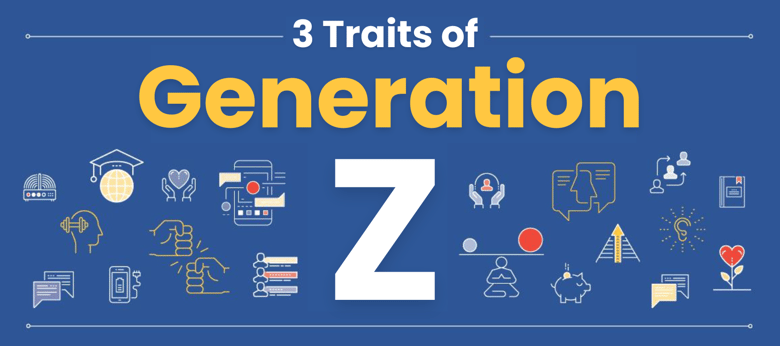Corporate America spent billions researching and prepping for Millennials in the workplace. But the youngest Millennial is now 25. Are you ready for what’s next? We surveyed more than 1000 members of Gen Z to get their thoughts and expectations for a workplace and researched hundreds of articles to bring you this Ultimate Guide to Gen Z in the Workplace.
This is an excerpt from The Ultimate Guide to Gen Z in the Workplace. Read the whole e-book here. 
Who is Gen Z?
Generation Z—AKA Post-Millennials, AKA Gen Z, AKA the iGeneration, AKA the Digital-Native Generation—typically contains those born between 1996-2010. Gen Z started entering the workforce in 2017, so it’s already past time to start thinking about how to accommodate this new generation.
Research shows that Gen Z will make up almost a quarter of the global workforce by 2020, making them the fastest-growing generation in the workforce. The internet, smart phones, September 11th, the Great Recession, and equality movements have all shaped the Gen Z viewpoint. They see and react to the world differently and have developed some unique attributes. Once organizations understand the events that influence Gen Z’s worldview, they are better equipped to empathize with the priorities many members of Gen Z share.
Gen Zers are socially responsible.
Gen Z is the most diverse generation the United States has even seen—55% Caucasian, 24% Hispanic, 14% African-American, and 4% Asian. Almost half consider themselves a minority. This increasing diversity has led a fifth of Gen Z to believe a team's most important element is its ethnic diversity. 72 percent of Gen Z believe that racial equality is the most important issue of today and 49 percent think their employer should do more to promote workplace inclusion (compared to 26% of Baby Boomers). For Gen Z, diversity is an expectation.
Gen Z is more comfortable calling out workplace discrimination than past generations. Almost a third say that a glass ceiling prevents career progression for women and minority groups. One in five also claim that being a woman or minority negatively affects chances of securing a job or promotion. Half of Gen Z believe the same goes for having a disability.
Gen Z’s familiarity with diversity and the fight for fairness pressures them to drive society forward, making them one of the most stressed generations yet. In the American Psychological Association’s 12th annual Stress in America survey, Gen Z reported what caused them stress:
- Mass shootings (75%)
- Rising suicide rates (62%)
- Climate change (58%)
- The separation and deportation of immigrant families (57%)
- Sexual harassment and assault reports (53%)

Gen Zers are well-educated.
99 percent of new jobs created since the 2008 recession have gone to workers with some college education. The recession decimated blue-collar and clerical jobs, but the recovery added primarily managerial and professional jobs. While the number of jobs rebounded after the recession, they aren’t the same jobs that were lost. It is estimated that by 2020, two-thirds of all U.S. jobs will require education beyond a high school diploma.
We asked Gen Z if they felt a need to gain additional education to combat this trend. We found that nearly 70 percent believe they need at least a bachelor’s degree in order to maintain a comfortable lifestyle. Nearly 80 percent fear they won’t be able to get their dream job without at least a bachelor’s degree.
While Gen Z sees the value in higher education, they’re cautious about obtaining advanced degrees. Only 64 percent of Gen Z are considering earning an advanced degree, 7 percent less than Millennials. Postsecondary enrollment across the nation fell 1.5 percent over the past year; enrollment in for-profit postsecondary schools dropped even more.
According to the NY Times, college tuition and fees increased 439 percent from 1982 to 2007 (adjusted for inflation), while median family income rose only 147 percent. The increasing cost of higher education means American student loan debt has increased to more than $1.5 trillion dollars in 2017 (up from $200 billion in 2003).
As college becomes more and more expensive, we asked Gen Zers about their education and student loans. Of our Gen Z respondents, only 18 percent are student-loan-free and when asked how confident they are that they’re be able to repay their student loans, only 30 percent responded positively.
Gen Zers are entrepreneurs.
Millennials have long been deemed a generation of job-hoppers. Will Gen Z maintain this trait?
Gen Zers anticipate being just as likely to work for multiple companies throughout their career as Millennials, but they are much more entrepreneurially-minded.
In the Huffington Post, TEDx speaker and organizational development consultant Crystal Kadakia wrote, “72 percent of high school students want to start their own business someday. 61 percent expect to start a business right out of college.” This means that Gen Zers are 55 percent more likely to want to start a business than their Millennial counterparts. Kadakia continued, “little do employers know, but Corporate America is quickly becoming the ‘backup’ option—what do to if all else fails.”
As Gen Z’s interest in entrepreneurship rises, it’s also becoming easier and easier to become and entrepreneur. Anne Gherini, a marketing executive, writer, and public speaker, explains “the barriers to entrepreneurship are constantly being lowered, affording Gen Z more time to devote to being creative and taking advantage of their youthful optimism. The likelihood of this generation following the paved path Millennials have left for them is low. Gen Z will forge new ways of building businesses.”
So how can companies keep up? Learn how to empower your Gen Z workers in this Ultimate Guide to Generation Z in the Workplace.





